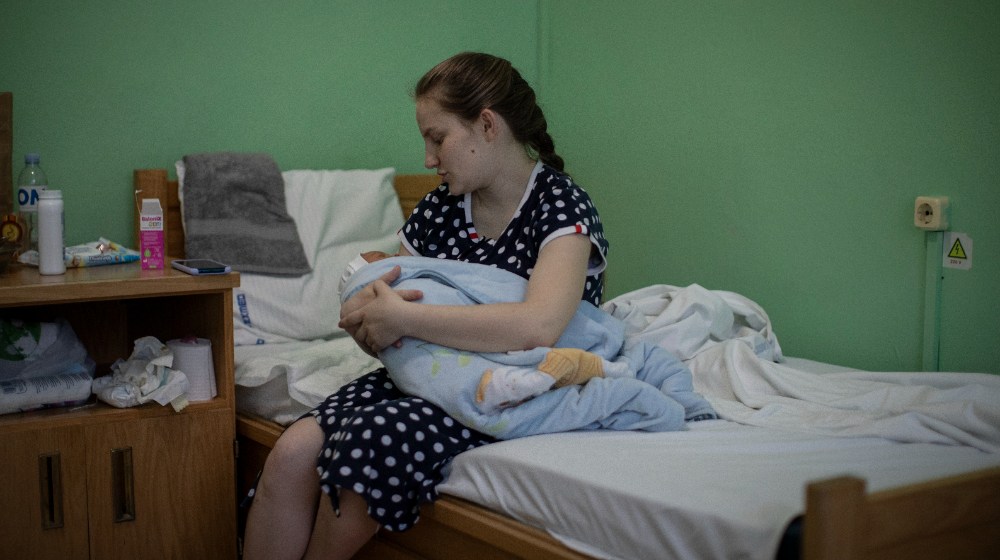News
Ukrainian refugees in Moldova guaranteed access to comprehensive sexual and reproductive health services
- 29 June 2022
News
KYIV, Ukraine – “I caught the last evacuation train out. The next day, the station was bombed.” Katya is still haunted by the very different turn her life could have taken.
At seven months pregnant, she had been hiding with her family in a cold basement for 11 days in the city of Lysychansk, in eastern Ukraine. When she developed kidney stones and became unwell, she made the painful decision to leave her husband, parents and sister behind to embark on a gruelling two-day journey alone to the neighbouring Republic of Moldova. “We rode in a sleeping car, with four people occupying one seat,” she said. “It was not an easy trip.”
Olga was also seven months pregnant when the sirens started wailing and bombs began falling on her home town of Ochakiv, near the southern port city of Odesa. She knew she had no choice but to flee, bringing with her all she could carry – including her four-year-old son, Timofey. But by the time she left, a queue of cars stretched back further than she could see, so she walked the 12 kilometres to the border. “It took us a long time. I had many bags and a tired toddler stumbling along,” she recalled to UNFPA.
Navigating childbirth alone and far from home
When they made it to the Republic of Moldova, Olga and her son were hosted by a family in Balti, the country’s second largest city. She was struck by the warm welcome that greeted them, from the family who invited them into their home to the neighbours who brought them food.
But the trauma of the war and having to flee her life as she knew it had left Olga with severe stress. While in the third trimester of her pregnancy, she was admitted to the Balti maternity hospital so doctors could monitor her, and later gave birth to a healthy daughter via caesarean section. When she arrived in the Republic of Moldova, Katya too had been referred to a local clinic, receiving swift and comprehensive antenatal care, before delivering a healthy baby boy at the same maternity hospital as Olga.
Both women were amazed to learn that their full treatment, delivery and anaesthesia at the hospital were all provided free of charge thanks to an agreement signed between UNFPA and the Moldovan national health insurance system. The agreement guarantees that until 31 December 2022, refugees from Ukraine can access the same free sexual and reproductive health care services as Moldovan citizens, including emergency obstetric care for women experiencing what can be life-threatening complications.
Ensuring access to health care and support
The initiative is critical for some 22,000 Ukrainian women refugees of reproductive age in the Republic of Moldova, of whom 1,500 are currently pregnant. As well as skilled care before, during and after birth, the women can access cancer screenings, family planning services, treatment for sexually transmitted infections and other essential sexual and reproductive health services.
“We do everything we can for both refugees and Modolvan women to ensure that a healthy child is born and that mothers leave the hospital fit and well,” said Caroline Frumusaki, chief physician at the hospital. Ms. Frumasaki personally oversaw Olga’s prenatal care and the birth of her daughter, and told UNFPA her mission is to make sure that all women, wherever they are from, receive the maternal and child health care they need, when they need it.
UNFPA is working closely with the Government of Moldova and partners to ensure that women and girls of all ages who have been forced to flee their homes in Ukraine can continue to access life-saving sexual and reproductive health services and information, as well as psychosocial support to deal with the trauma and stress they will likely experience from having their lives upended by the war.
A bittersweet moment
While Olga is relieved that her daughter was born safely, what should have been a joyful period of her life has instead been bleak. “Our New Year's resolution was to buy a new home. We had planned to celebrate the birth of our baby girl and our son’s fifth birthday with family and friends. But everything has changed, nothing is certain anymore. It’s difficult to make resolutions now,” she said.

It has been just over four months since Russia’s brutal invasion of Ukraine, and the Republic of Moldova is estimated to be hosting some 86,000 Ukrainian refugees. UNFPA has so far distributed more than 10 tonnes of reproductive health supplies to hospitals and clinics across the Republic of Moldova – among which the Balti maternity hospital where Katya and Olga gave birth. The deliveries contain medicine and equipment for emergency obstetric care, treating sexually transmitted infections and clinical management of rape and will cover the needs of some 450,000 people, including Ukrainian refugees.
Katya said she is grateful that her son, Matvey, is healthy, although this was far from how she had imagined the birth of her first child. Alone, far from home and with an uncertain future before them, she said she often feels anxious and lost. “My husband and I dreamed about this day for so long. His father is very excited and I can’t wait for the day when he can hold our baby in his arms.”